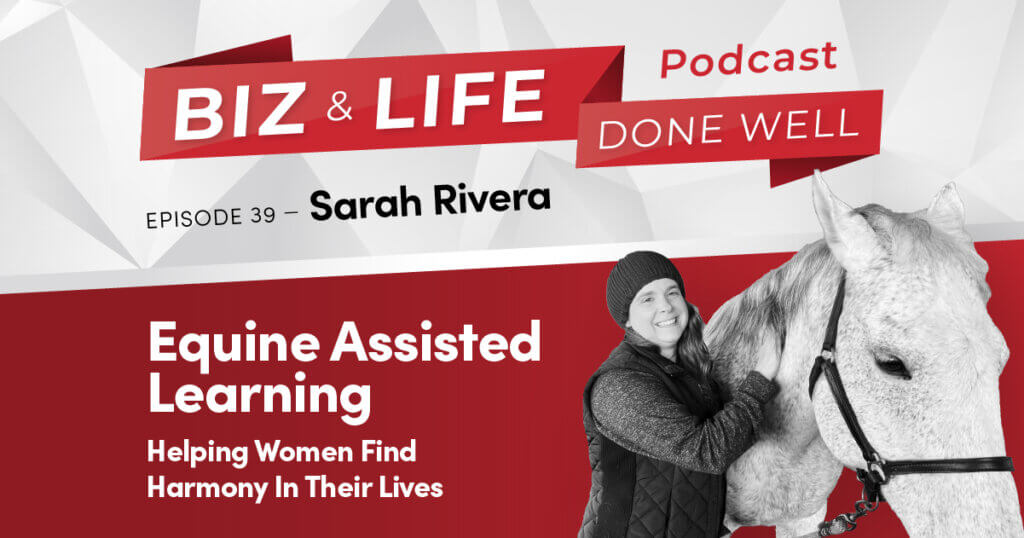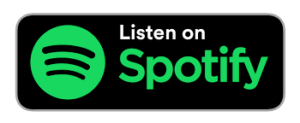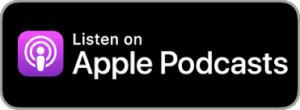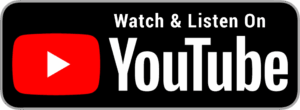Title: Sarah Rivera – Her Equine Assisted Learning Helps Women Find Harmony In Their Lives
Guest: Sarah Rivera
Peter: Welcome to the Biz and Life Done Well podcast, where we explore what it means and what it takes to do business and life well. I’m your host, Peter Wilson. If you’re like me, you’re intrigued by stories of common people who have achieved uncommon success in business and life. Join me as I interview fascinating people about how they got started, their successes and failures, their habits and routines, and what inspires them. Today my guest is Sara Rivera.
She is a certified EAL with Take the Lead and we met, Sarah and I, through BNI, which is a networking group. She recently joined the group and I’ve gotten to know her a little bit. So decided I wanted to have her on the podcast today and I’ve wanted to talk about what she does and why she does it. And the first question I have for her is, she’s a certified EAL, what is an EAL?
Sarah: Well, you for having me on the podcast. So EAL stands for equine assisted learning and it’s a certified program, but it’s still fairly new. Most people have never heard of equine assisted learning. Typically, they think it’s therapy. And it’s really a kind of a separate curriculum.
It has therapeutic benefits, but we’re not therapy. We are strictly education, if you will.
Peter: Got it. So you say equine, you’re talking horses, right?
Sarah: I am talking horses. So I, my horses have a special title. I call them my equine life coaches, because I’m not the one doing the coaching. I just facilitate the class. Your teacher, your coach is a horse.
Peter: What? Okay. I know a little bit about what you do, but I’m still just super intrigued. So I mean, first question, sort of the most obvious question outside of what is EAL is, you know, why horses?
Sarah: Well, horses have very unique characteristics to survive in the wild. They are on the lunch menu in the wild. So they have very highly attuned senses to keep a lookout for predators. They can even hear a human heartbeat from 50 feet away. They have amazing eyesight in the dark, they hear very well, but their number one language is body language.
And they can read human body language very well. Since they have such, you know, highly attuned senses, they can tell where human is at emotionally without a human ever saying a word. So we have a saying that you can’t lie to a horse. In turn, though, a horse will not lie to you. Cognitively, they live in the moment.
They cannot make assumptions about your future, or judgments on your past. They just do not live in past or future, they live solely in the moment. And they have one of the highest reaction times of a land animal. So the reaction that they give you is instant, and it’s honest, and it’s completely unbiased. And because of that, people can receive that feedback a lot better than say maybe from a human.
Because as humans, we know that other humans are looking at us through a different lens or perspective or a set of biases. A horse simply doesn’t have that. So it’s much easier for people to receive that feedback.
Peter: Interesting. So are people riding the horses or how does that work? You know, what is like the format of you know, what you do?
Sarah: We actually don’t do any riding. So it is on the ground in partnership with these amazing animals. When you ride, it changes the dynamic. When you’re on the ground nose to nose, that horse has the opportunity to look at you and say yes or say no. I’ve actually had a mom in my class who was having the hardest time getting the horse to listen to her.
She would walk off when she wanted the horse to stop and the horse would stop when she wanted to go and she finally threw her hands up in the middle of the class and said, Oh my gosh, my kids do exactly the same thing. One of the most powerful pieces of this program is that we take the experiences in the arena and parallel them back to our human lives. And I didn’t ask her about her kids, she made that connection for herself that there was something about the way she was presenting her body language and going about how she was asking that was not inspiring confidence. And so the horse decided that she wasn’t going to listen to her and she realized that that was something that was also happening in her personal life. So the program’s very experiential.
And when you get that no from a horse, you have to go back to yourself and figure out what am I communicating? Or am I not giving enough leadership body language to earn that trust and that respect from the horse in order for the horse to follow me? Because a horse always needs a leader. It’s the number one law. They must have a leader and if they do not, they will step in to take leadership.
They don’t care if you’re a horse or a human, they will step in because their survival depends on that.
Peter: So do you call it a class or an event or what what sorts of situations do you offer the folks that you work with?
Sarah: So they’re women’s workshops, I deal exclusively with women. And I have a variety from people who aren’t quite sure they want to get into it, I have a little ninety minute session. And then I have some half day, I call them recharge retreats, because you do, you leave feeling recharged and kind of this new perspective on yourself. And then I have a six week renewal series, and that’s ninety minutes once a week for six weeks, but the curriculum is built on each prior lesson. And it was made by a wonderful woman named Tamara McKinnon.
And the curriculum is backed by a five year study with the University of Calgary, Saskatchewan and Regina, I believe, all Canadian universities. But they study the curriculum and found that students did retain a lot of the life skills and lessons that they learned in the curriculum and each curriculum program has a different focus or a life skill focus, you will. Communication, boundaries, leadership, listening, things that we’re always as humans trying to improve. The only difference here is that you don’t have a human teacher, you have a horse teaching you these things.
Peter: Wow. I’m completely intrigued and just a little sad you only work with women. So I’m really curious, why did you get into this?
Sarah: I have always loved horses since I was a little girl. I was the, you know, the kid that would save all year for one week of horse camp. Never owned my own horse when I was a kid and tried to do riding lessons for a while and then you know, got married, had kids, it just didn’t fit into my life anymore. And I was mentally trying to prepare myself to never really be in this field again. And that was kind of soul crushing because there’s things that feed our soul.
And for me that that’s always been horses. We moved to Washington and my husband was like, why aren’t you doing anything with horses? So I went to volunteer at a rescue called Save a Forgotten Equine and there I met my, my horse, Mercy. She’d been returned twice to the rescue. And it was kind of a love at first sight thing.
First time I saw her, I just knew that’s, that’s my horse. I had also run across a clip on YouTube and I watched it several times. I was so just amazed. It was a group of, I believe veterans that were struggling with PTSD and they were going through a program with horses and this program was amazingly successful. And I saw that and it was just like all the light bulbs came on and I was just absolutely amazed and said, I don’t know how and I don’t know when, but I’m going to figure out how to do this.
It took me quite a few years of research to find a program that I felt was a good fit for me and for what I wanted to offer. I went and I got my certification through equine connection and what decided 2020, I’m going to launch and then COVID hit. So we’re trying again in 2021. It’s doing much better.
Peter: Kind of hard to do a zoom session like they have those, they have those goats on Zoom. Have you seen that where they
Sarah: I have not.
Peter: They crashed. It’s some British farm and they were, it was like a, you know, like a visit the farm, kind of a petting zoo kind of thing. And they were basically broke. And so they said, well, I don’t know how they started it, but they started offering Zoom. So for, I think it’s seven pounds for fifteen minutes, you can get a goat to crash your Zoom party or your Zoom call.
And they’ve done like thousands of these calls.
Sarah: Oh my gosh. That is brilliant.
Peter: Yeah. So anyway, I digress. So I’m curious, how did you pivot or shift or adjust or get through? What was your secret for getting through?
Sarah: Well, I had just started out so I didn’t have really any overhead yet. So I was able to hold out. And I don’t have a storefront, you know, we’re hosted by an amazing barn, Alpine Ridge Equestrian in Arlington. And so I was able to wait it out and just restarted this year. And I’ve really enjoyed it.
Just watching women at the end of class, they’re glowing, and they’re excited, and they get it, they’ve gotten that amazing connection. And it really just kind of fills you up and makes you feel that, you know, you’ve re centered or you’ve found a little bit of clarity or maybe a new perspective about how you see the world. I know for me personally, when I go to the barn, that chatter in my head stops, you know, I’m a busy mom, I’m trying to run a business, I’ve got other things that I’ve been working on and you always have that internal chatter. Even if my external world is quiet. Yeah.
That internal chatter keeps going. But you go to the barn and you start working with a 1,200 pound animal and you are all of a sudden in the moment, You’re not thinking about anything else except what’s happening right there in front of you and how your connection is with this amazing creature. It just kind of gives your brain a complete break. And it also helps create that mental space to clarify things. I’ll have moments in the arena where I just figure something out.
And it was because I had the quiet mental space to allow for that process to happen. My horse also is teaching me daily. She lets me know when I’m off my game, But she also is been very patient. I’d say she is one of my greatest teachers I’ve ever had.
Peter: You know, what’s interesting is you talk about finding that focused, you know, the inner chatter and it goes away. I get that same experience when I’m on the mountain at the top of a really crazy run, you know, with skis on or snowboard and you head down and you really got to shut everything else out and just focus on where you’re at right then, which is for me personally, it’s kind of addicting actually.
Sarah: Well, I think that the farther we get from nature, the busier our heads can get. There’s something about nature that puts us back into an alignment, if you will. Yeah. Because we live in a world that’s so far removed from nature most of the time, we can easily get that frustration or we’re trying to multitask when you go back to nature and things are very simple. They’re very basic.
And we have a lot of head knowledge, but I think what people are forgetting is that internally, not in our minds, but in our biology, if you will, we hold knowledge there too.
Peter: Yeah.
Sarah: And tapping into that is very powerful. It’s like watching, have you ever watched that show alone where they go off and try to survive for ninety days by themselves?
Peter: Right.
Sarah: And you’ll see the people that are in it for the money. And by the end, they don’t care about the money anymore. They’ve had so much time with nature and time to think, they’re telling you they miss their family, their relationships are their priority. They don’t care about the money anymore, because Right. They’ve realized what is truly, what truly matters in life.
And I think nature has a way of bringing that back into focus for us.
Peter: Yeah, the other thing that I think with respect, like one of the reasons is because nature is always changing, right? Like it’s like one day you’re at the barn, I would imagine that, you know, your horse is not a robot. So it’s not always going to react the same way every time. You’re not going to be the same person. That’s what I love about nature.
Just, you know, even if I hike on a trail, the same trail every day, there’s always something different.
Sarah: Absolutely. And every workshop I do, there’s something different.
Peter: Really?
Sarah: I can be teaching the same workshop, same format, but it’s with different women, it can be with the same horses, but they are going to give that feedback. And it is going to be a different class completely, even though it’s the same format, it’ll be a completely different experience every time. And it’s amazing to hear people’s moments because, you know, they’ll just stop in the middle class and they’ll just tell you, which is, it’s really neat. I had a retired lady who had a disabled husband and she just, my horse went gooey for her. Mean, my horse is not a gooey horse.
Was absolutely gooey, just melted into this lady. And I mean, if she was a kid, she would have been like wrapped up in her arms. It was I was kind of jealous. It was an incredible moment. And then when we were debriefing, she said, you know, my husband can’t do what he used to be able to do.
But I realized today that that doesn’t make our relationship less valuable or that I have to do everything for him, that he can still contribute in his own way and I should let him contribute in his own way. And that for her was very powerful. That wasn’t me, that was her connection with the horse that brought her to that realization for herself. And that’s the most powerful piece is that these women are having the realizations and the self education and discoveries and personal growth for themselves through that connection with the horse. I’m just there to make sure everybody’s safe and you know, facilitating the activities is truly that connection that gets them to stop and to evaluate what’s working, what’s not working, what do I have the power to change.
Peter: Now, how long have you been involved in EAL? When, you know, like when did you give your first sort of lesson or class?
Sarah: My first class was last year, I got my certification in 2019. I went to Arizona for a few days and did some hands on certification courses and testing. And I was completely after that, I mean, I couldn’t imagine doing anything else. You know, I’ve had jobs, but this is a passion. This is a whole nother level.
Peter: So you mentioned stories, and you’ve given us a few, the mom, the woman with the disabled husband. Are there any other, you know, stories that come to mind that, you know, just sort of illustrate the power of the relationship with the horses?
Sarah: So I had one mom who was terrified of horses, but she came anyway. And the connection she formed with my horse Mercy was amazing. And at one point, she completely broke down in the middle of the class. And for the first time was able to articulate some of her parenting struggles that tied back to some childhood trauma. And it was the first time she had ever been able to articulate that.
And because she was able to articulate that, she could then decide how to move forward and how she was parenting her own child, if she was going to continue to parent her child out of fear from what happened to her. Or if she can move forward and parent in a more positive light out of fear. No more worrying that what happened to her would happen to her child.
Peter: So if somebody’s listening and they’re interested in finding out more, what do you recommend they do to kind of get in touch or learn more? What’s the first step that you recommend that folks take?
Sarah: I would say go and peek at the website, www.womentakelead.com and it is still developing, I’ve got more photos coming of some classes. But that’s going to give more detail about what we do. You can always email me sarahwomentakelead dot com I’d be more than happy to have a conversation and, you know, tell people more about what this is all about. We are just getting started. So I still have fall dates that need to go up on the calendar, but it’s work that I love and it’s work that I’m passionate about and something that I hope to do for many years to come.
Peter: That’s great. So, so you offer a variety of sound, as I recall, you mentioned earlier, there’s a variety of different, you know, there’s sort of like folks can just dip their toe in the water or they can kind of go all in. You offer different levels of
Sarah: I do. I do. The one that’s coming up in the fall, I offer two six week renewal series. That one’s gonna be much more of a personal deep dive. So you’re gonna have some journaling time at the end of class because I mean, I am guilty of this as a mom of being so busy that I don’t sit down to hear my own thoughts.
I don’t sit down to process what it is I’ve just experienced. So we leave fifteen minutes at the end of each class to have that quiet time to just process what has happened in the arena. And then there’s other guided journaling that goes with that. But at the end of that series, I want women to be able to answer the question of what is my right next step? What do I need to do to move forward on a positive foot in my life?
And that’s going to be different for each person. For somebody might be nutrition, for another person, it might be life coaching, somebody might decide that they need to do a career change, that’s gonna be different for each person. I want them to have the space and time to process and find that vision for the future for themselves.
Peter: Great. So are you recommending your offerings for women of any age? Is there a particular age group or how does that work?
Sarah: I would say probably 25 to 65. I find it’s really beneficial for a lot of moms, but then also retirees who are still able to, you know, get into the arena and love horses but don’t necessarily want to ride horses. That connection is just fantastic and we don’t do anything scary, it’s walk and stop. We don’t really do any jumping or any.
Peter: Okay.
Sarah: Nothing aggressive. So it’s a lot of grooming, a lot of just teamwork, as you’re working with the other women in your class. And the classes are small. We don’t have any more than two horses and eight participants and they’re kept small on purpose. We want to have that quality experience.
And we also want to have a high level of safety.
Peter: Well, I’ve really appreciated having you on today, Sara. This has been great to get to know more about you and take the lead. And I’m just excited for what the future holds for what you’re doing. You’re on the right track, I can tell.
Sarah: Well, you for having me. I really enjoyed coming on today.
Peter: Thanks for listening to this episode of Biz and Life Done Well with Peter Wilson. You can subscribe to us on iTunes, Google Podcasts, Spotify, and most of the other popular podcast platforms. Please tell your friends about us and leave us a review so even more people will find out about us. Thanks again. We’ll see you soon.



